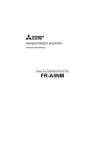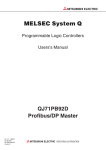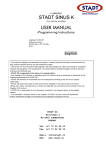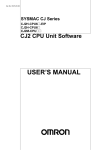Download FR-A5NP Instruction Manual
Transcript
TRANSISTORIZED INVERTER TRANSISTORIZED INVERTER -INSTRUCTION MANUAL- TRANSISTORIZED INVERTER PROFIBUS DP COMMUNICATION OPTION FR-A5NP FR-A5NP IB(NA)-0600148E-A (0303) MEE Printed in Japan Specifications subject to change without notice. INSTRUCTION MANUAL HEAD OFFICE:MITSUBISHI DENKI BLDG MARUNOUCHI TOKYO 100-8310 Thank you for choosing the Mitsubishi transistorized inverter option unit. This instruction manual gives handling information and precautions for use of this equipment. Incorrect handling might cause an unexpected fault. Before using the equipment, please read this manual carefully to use the equipment to its optimum. This section is specifically about safety matters Do not attempt to install, operate, maintain or inspect this product until you have read through this instruction manual and appended documents carefully and can use the equipment correctly. Do not use this product until you have a full knowledge of the equipment, safety information and instructions. In this instruction manual, the safety instruction levels are classified into "WARNING" and "CAUTION". WARNING Assumes that incorrect handling may cause hazardous conditions, resulting in death or severe injury. CAUTION Assumes that incorrect handling may cause hazardous conditions, resulting in medium or slight injury, or may cause physical damage only. Note that the CAUTION level may lead to a serious consequence according to conditions. Please follow the instructions of both levels because they are important to personnel safety. SAFETY INSTRUCTIONS 1. Electric Shock Prevention WARNING • While power is on or when the inverter is running, do not open the front cover. You may get an electric shock. • Do not run the inverter with the front cover removed. Otherwise, you may access the exposed high-voltage terminals and charging part and get an electric shock. • If power is off, do not remove the front cover except for wiring or periodic inspection. You may access the charged inverter circuits and get an electric shock. • Before starting wiring or inspection, switch power off, wait for more than 10 minutes, and check for no residual voltage with a tester or the like. WARNING • Any person who is involved in the wiring or inspection of this equipment should be fully competent to do the work. • Always install the option unit before wiring. Otherwise, you may get an electric shock or be injured. • Handle this option unit with dry hands to prevent an electric shock. • Do not subject the cables to scratches, excessive stress, heavy loads or pinching. Otherwise, you may get an electric shock. • While power is on, do not move the station number and baud rate setting switches. Doing so can cause an electric shock. A-1 2. Injury Prevention CAUTION • Apply only the voltage specified in the instruction manual to each terminal to prevent burst, damage, etc. • Ensure that the cables are connected to the correct terminals. Otherwise, burst, damage, etc. may occur. • Always make sure that polarity is correct to prevent burst, damage, etc. • While power is on or for some time after power-off, do not touch the inverter as it is hot and you may get burnt. 3. Additional instructions Also note the following points to prevent an accidental failure, injury, electric shock, etc.: (1) Transportation and mounting CAUTION • • • • Do not install or operate the option unit if it is damaged or has parts missing. Do not stand or rest heavy objects on the product. Check that the mounting orientation is correct. Prevent screws, metal fragments or other conductive bodies or oil or other flammable substance from entering the inverter. (2) Test operation and adjustment CAUTION • Before starting operation, confirm and adjust the parameters. A failure to do so may cause some machines to make unexpected motions. (3) Usage WARNING • Do not modify the equipment. CAUTION • When parameter clear or all parameter clear is performed, each parameter returns to the factory setting. Re-set the required parameters before starting operation. • For prevention of damage due to static electricity, touch nearby metal before touching this product to eliminate static electricity from your body. (4) Maintenance, inspection and parts replacement CAUTION • Do not test the equipment with a megger (measure insulation resistance). (5) Disposal CAUTION • Treat as industrial waste. (6) General instruction All illustrations given in this manual may have been drawn with covers or safety guards removed to provide in-depth description. Before starting operation of the product, always return the covers and guards into original positions as specified and operate the equipment in accordance with the manual. A-2 CONTENTS 1. INTRODUCTION 1 2. INSTALLATION 3 2.1 2.2 2.3 2.4 2.5 Pre-installation Checks ..................................................................... 3 Mounting Procedure ......................................................................... 3 Connecting To The Network ............................................................. 9 LED Status Indicator......................................................................... 9 Installing MEAU0865.GSD ............................................................... 9 3. OPERATION 3.1 3.2 3.3 3.4 3.5 3.6 10 Operating Modes ............................................................................ 10 Selecting the Operating Mode ........................................................ 10 Functions Available in the Operating Modes .................................. 11 Input From PROFIBUS to Inverter.................................................. 11 Output From Inverter to PROFIBUS ............................................... 12 Operation When an Alarm Occurs.................................................. 13 4. PROFIBUS DEVICE DATA 14 5. INVERTER PROFIBUS DATA WORD DEFINITION 16 5.1 5.2 5.3 5.4 5.5 5.6 Word 1 (PKE).................................................................................. 18 Word 2 (IND)................................................................................... 19 Word 3 (PWE1)............................................................................... 19 Word 4 (PWE2)............................................................................... 19 Word 5 (ZSW1)............................................................................... 20 Word 6 (HIW).................................................................................. 20 6. PARAMETER DEFINITIONS 21 6.1 IND = 0000h, Real-Time Monitor Area ........................................... 21 6.2 IND = 01pph, System Environment Variable Area.......................... 22 6.2.1 IND = 0100h, pp = 00, SEV_I, Block I, SEV Interface ............. 22 6.2.2 IND = 0101h, pp = 01, SEV_II, Block II, Alarm History............ 23 6.3 IND = 0200h, Normal Parameter Area............................................ 24 6.4 IND = 0300h, 900f Parameter Area ................................................ 31 6.5 IND = 0400h, 900% Parameter Area .............................................. 31 6.6 Time/Program Settings: Frequency (f) Components (IND = 0600h)............................................................ 32 6.7 Time/Program Settings: Motor Run Direction (D) Components (IND = 0700h)............................................................ 33 6.8 Time/Prog Settings Time (t) Components (IND = 0800h)............... 34 7. TROUBLESHOOTING 7.1 35 Inspecting Display On Parameter Unit And Status LED On A5NP. 35 8. SPECIFICATIONS 36 Appendix 37 Appendix. A Instruction For MEAU0865.GSD ........................................ 37 Appendix. B Commonly used PROFIBUS-DP commands ..................... 38 Appendix. C Network Communication Coordination using the FR-A5NP PROFIBUS-DP Option Module. ................... 51 Appendix. D Other Option Specific Parameters...................................... 53 1. INTRODUCTION GENERAL The purpose of this manual is to provide general information, installation, and operation procedures for the FR-A5NP PROFIBUS-DP option, used with the FR-A500(L)/F500(L) inverter, herein after referred to as the inverter. Read this manual completely before installing, operating or servicing the option unit. This manual is intended for use by qualified personnel. Installation should only be performed by qualified personnel. You must be able to operate and program serial devices to use the equipment. This option unit lets you connect an FR-A500(L)/F500(L) series inverter to a network adhering to the PROFIBUS-DP communications protocol. PROFIBUS-DP is the performance-optimized version of PROFIBUS for time-critical operations. Illustrations provided in this manual may have covers or safety guards removed to provide a clear view. Before starting operation of the product be sure to install covers and guards into the original position. The following is a list of important features for the option unit • Data Rates to 12,000,000 bps. • Up to 126 stations supported on a single network • Network access to all inverter parameters. • Certified by PROFIBUS Nutzer Organization in July 1998 • PROFIBUS® is a trademark of PROFIBUS User Organization. • Other company and product names herein are the trademarks and registered trademarks of their respective owners. DESCRIPTION The FR-A5NP option unit consists of two circuit boards. The option unit is mounted in option port #3 on the inverter unit. The inverter top cover must be removed to install the option unit. After installation, the top cover is reinstalled and connection to the PROFIBUS-DP bus is completed through a connector accessible through the top cover. Two station switches, mounted on the top printed circuit board, allow the assigning of station numbers from 0 to 126. A LED status light mounted next to the connector provides status information on the communication link. 1 INTRODUCTION Front view Mounting hole Mounting hole FR-A5NP CDE AB 5 234 6 F01 SW1 789 Node address switch Mounting hole CDE AB 789 SW2 5 234 6 F01 Profibus connector (DB9 pin connector) Operating status indicator LED Option fixing hole Rear view Mounting hole connector Option fixing hole 2 2. INSTALLATION Remove the drive cover following the inverter instruction manual and install the option unit using the following procedure: 2.1 Pre-installation Checks (1) Check the inverter type. Use the option unit only with an FR-A500(L)/F500(L) series inverter. Do not use it with any other series (e.g. A200E, A200, A100, Z and F series). These other series inverters have a different option connector to prevent installation. If you force the connector, you may damage the inverter as well as the option unit. (2) Make sure the inverter input power is off. The option unit can be damaged if installed with the input power on. (3) Make sure the PLC master (or PROFIBUS-DP master) is properly grounded before continuing. 2.2 Mounting Procedure WARNING Hazardous voltage present. Always isolate power from the inverter and wait 10 minutes until the bus charge light is off to ensure the charge lamp has gone out before inserting or removing this option unit or touching the terminals. (1) Insert this option unit only into the OPTION PORT# 3 of the inverter. (2) Carefully insert the connector of the option unit into the connector of the inverter as shown in Figure 2-1. Use the two mounting holes and the guide hole to align the bottom board with the matching machine screw inserts and the plastic guide pin on the inverter. Also be sure to fit the unit into the option fixing hook (It is available in Aug., 2000). Make sure that the inverter option is firmly seated in the inverter and the connector is fully plugged in. (3) Secure the option unit to the inverter with two mounting screws. If the screw holes in the option unit do not line up with the inverter mounting holes, check that the connectors have been fitted correctly. 3 INSTALLATION VSP896M205 3 x 8 mm MACHINE SCREWS WITH FLAT AND LOCK WASHER FR-A5NP PLUG IN OPTION OPTION TO VFD CONNECTOR INVERTER INVERTRE OPTION PORT #3 MACHINE SCREW INSERTS Figure 2-1. Option Unit Aligned with Option Port #3 (4) Option unit is now mechanically installed as shown is Figure 2-2. INSTALLED PROFIBUS OPTION IN PORT #3 TERMINAL BLOCK CONNECTOR TO PROFIBUS INVERTER OPTION PORT #2 INVERTER OPTION PORT #1 PARAMETER UNIT PORT ALARM LAMP POWER LAMP Figure 2-2. Option Unit Installed In Inverter 4 INSTALLATION (5) Construct a short cable to connect the network to the inverter. On one end of the cable, install a connector compatible with the network. On the other end, install a DB9-style male connector. Make sure the cable can support 12.0 Mbps communications (as specified in the EEIA-RS485 standard). This cables connections are shown in Figure 2-3. REMARKS Option unit Pins 6 and 5 supply +5Vdc (rated at 100 mA). Connection of Pins 6 and 5 is optional. Pin 4 may not be required for your master. Connection of Pin 4 is also optional. Refer to the user’s manual of your PROFIBUS-DP master. CONNECTOR SCREWS PROFIBUS CONNECTOR (MALE DB-9 NETWORK DEVICE) PROFIBUS NETWORK CABLE (TO NEXT NETWORK DEVICE) PROFIBUS NETWORK CABLE (FROM NETWORK) Figure 2-3. Connection Cable 5 INSTALLATION REMARKS The DB9 pinout described in the table below is defined by the PROFIBUS Standard DIN-19-245 Part 1.The two data signals are named RXD/TXD+ and RXD/TXD-. However, manufacturers of RS-485 driver ICs typically refer to these signals as A and B’. The PROFIBUS signal RXD/TXD+ is typically assigned to the RS-485 signal A and the RXD/TXD- to B’. Some PROFIBUS-DP implementations confuse these two signals. If you are having trouble establishing communications from the FR-A5NP to your PROFIBUS-DP master, verify that the proper data signal assignments are made. It may be necessary to swap these two signal lines. DB-9 Pin 1 2 3 4 5 6 7 8 9 A5NP Internal Signal Name NC NC A RTS Isolated GND Isolated +5Vdc Supply NC B' NC PROFIBUS-DP Signal Name Comments RP RxD/TxD+ CNTR+ DGND (V-) No Connection Reserved for Module Power Receive/Transmit-Data+ Control+ (Request to Send) Data Ground V+ (+5Vdc) Voltage+ RxD/TxDRP No Connection Receive/Transmit-DataReserved for Module Power NC — No Connection (6) To terminate the network at the option unit, install termination resistors at the terminal block as shown in Figure 2-5. Each PROFIBUS network has two ends. Units at both of those ends must be properly terminated. 6 INSTALLATION CONNECTOR SCREWS PROFIBUS NETWORK CABLE (FROM NETWORK) PROFIBUS CONNECTOR (MALE DB-9 WITH TERMINATION) Figure 2-5. Connector with Termination Resistors CONNECTOR SCREWS PROFIBUS CONNECTOR (MALE DB-9 WITH TERMINATION) PROFIBUS NETWORK CABLE (FROM NETWORK (INPUT)) Figure 2-6. Connectors with Cover Removed R1 R2 R3 1 2 3 4 5 R1=390Ω±2% 1/4W R2=220Ω±2% 1/4W R3=390Ω±2% 1/4W 6 7 8 9 Figure 2-7. Termination Resistor Connections REMARKS The option unit may be connected to a DB-9 connector that has these termination resistors built in. 7 INSTALLATION (7) Remove the option data port insert from the inverter cover. (8) Set the node address using the two rotary switches on the option unit. The valid addresses can range from 03 through 7B hex (123 decimal). The node address must be set to the value as configured when setting up your PROFIBUS master. The master must be aware of the node addresses assigned to the FR-A5NP or communications will not be established. Refer to user documentation for master details. WARNING Do NOT set the address from 7C to FF. If you do, the option unit and inverter will not operate correctly. CAUTION Do NOT set more than one station to the same address on a single PROFIBUS-DP network. SW1 is nearest to the LED and sets the most significant digit. For example, to set the node address to 7B hex (123 decimal), set SW1 to 7 and SW2 to B. (9) Replace the inverter cover, while making sure that the PROFIBUS connector is aligned with the option data port window. (10) Connect the PROFIBUS cable to the inverter by plugging the DB9style male connector into DB9-style female connector of the option unit, which should be visible in the option port window. 8 INSTALLATION 2.3 Connecting To The Network (1) Make sure the inverter is at rest with power off and the option unit is mounted in the inverter. Connect the PROFIBUS cable created in section 2.2 to the network. (2) It is now safe to apply power to the inverter and run it in PU, external, or net mode, provided that any external inverter control cables in addition to the PROFIBUS network cable are installed correctly. 2.4 LED Status Indicator After connecting the option unit to an active network, note the condition of the Operating Status Indicator LED. After power-up or reset, the LED can assume the following states: 2.5 Installing MEAU0865.GSD Green Off On State Of System Module Is Not Powered Or Module Has Not Completed Powerup Sequence Or Module Is NOT In Data Exchange Mode Or Network Connectivity Is Time-out. Module Is Operating Normally, Ready In Data Exchange Mode. All setup, management, or configuration software programs for PROFIBUSDP require the use of a Device Data Base (GSD) file MEAU0865.GSD, please install MEAU0865.GSD properly before using any of the setup, management, or configuration software programs. Refer to page 37 for more details. 9 3. OPERATION The operation of the inverter changes slightly when this option unit is installed. These changes are described in the following paragraphs. 3.1 Operating Modes In the PU operating mode, the inverter is controlled by a Parameter Unit (FR-PU04) or operation panel. In the External operating mode, the inverter is controlled by external signals connected to the inverters terminal block. In the Network (computer link) operating mode, the inverter is controlled by commands from a PROFIBUS master. 3.2 Selecting the Operating Mode The following table describes the actions required to change the operating mode. The FR-A5NP option may be used to monitor all data in the inverter in any operating mode. The inverter must, however, be in "Net Operation" mode for network control to be enabled. Net Operation mode is active when Pr.79=0 (factory default “normal mode”) or when Pr.79=6 (“switchover mode”). (For details of Pr. 79, refer to the inverter manual.) Mode Change Ext Operation ! PU Operation PU Operation ! Ext Operation Ext Operation ! Net Operation Net Operation ! Ext Operation Net Operation ! PU Operation Action Required Select the PU operation mode from the operation panel or press PU key on the parameter unit. Select the EXT operation mode from the operation panel or press EXT key on the parameter unit. PROFIBUS master writes 0014h to PNU 00Bh (IND=0100h). PROFIBUS master writes 0010h to PNU 00Bh (IND=0100h) PROFIBUS master writes 0011h to PNU 00Bh (IND=0100h) The following conditions must also be met before you can change the operating mode: • the inverter is stopped • the forward and reverse commands are off PNU 128h (IND=2) allows you to select the Network operating mode on power-up and after a drive reset. Once the Network operating mode is started, there must be PROFIBUS activity at least once every 5s. If the option unit does not sense valid PROFIBUS activity for 5s or more, it performs an option module alarm stop, the inverter display unit shows “E.OP3”, and you must reset the inverter to clear this fault. 10 OPERATION One way to ensure activity is to configure the PROFIBUS master to enable response monitoring. Alternatively, you can have the PROFIBUS master issue a null command (Command Word 1 = 0) or any other command. Refer to Section 5. 3.3 Functions Available in the Operating Modes The functions available to the drive depend on the operating mode. The following table indicates the command types available according to the operating mode: Control Type Command Type Net Ext Operating Command Yes(*1) No Output Freq. Set. Yes(*1) No Monitor Yes Yes PROFIBUS Parameter Write Yes(*3)(*4) No(*3) Parameter Read Yes Yes Inverter Reset Yes(*2) No Operating Command Yes(*1) Yes External Terminals Output Freq. Set. Yes(*1) Yes Inverter Reset Yes Yes *1 Depends on value of PNU 126h and 127h. *2 Inverter cant be reset if a PROFIBUS comm. error occurred. *3 As set in PNU 4Dh. *4 While stopped. PU No No Yes No(*3) Yes No No No Yes 3.4 Input From PROFIBUS to Inverter This option unit supports all Control Input Commands. The output frequency setting may range from 0 to 400 Hz in increments of 0.01 Hz. You can reset the inverter by having the PROFIBUS master write a 0000h to PNU 001h (IND=0100h). For parameter writing, all standard and special parameters are supported. 11 OPERATION 3.5 Output From Inverter to PROFIBUS You can monitor the following items: Availability of monitor depends on the inverter. Refer to the inverter manual for details. • Output Frequency • Output Current • Output Voltage • Frequency Setting • Running Speed (r/min) • Motor Torque • Converter Output Voltage • Regenerative Brake Duty • Electronic Overcurrent Protection Load Factor • Output current peak value • Peak Voltage • Input Power • Output Power • Input Terminal • Output Terminal • Load Meter • Motor Excite Current • Position Pulse • Cumulative Energy Time • Orientation Status • Actual Operation Time • Motor Load Factor • Cumulative Power Refer to page 21 for more details. For parameter reading, all standard and special parameters are supported. All available parameters are readable all the time, regardless of special settings that may be needed to read parameters using the PU or other communications option cards (e.g., PNU 3Dh to 40h and C9h to E6h). 12 OPERATION 3.6 Operation When an Alarm Occurs. The following table shows the behavior of the inverter and network when an alarm occurs: Fault Type Item Net Inverter Operation Stop Inverter (*2) Network Comm. Continue Inverter Operation Stop PROFIBUS Comm. Network Comm. Continue (*1) *1 Depends on the type of communication fault. *2 For examples, E.OP3, E.OC1. Ext Stop Continue Continue Continue (*1) PU Stop Continue Continue Continue (*1) CAUTION PROFIBUS-DP communication routines should check the " acknowledge bits ( PKE-AK) returned by slave device to verify successful transmission of the command and acceptance by slave device. See page 51 for details. For your safety, the output frequency of the inverter should always be monitored via Profibus. The actual frequency of the inverter should match the frequency setting issued by the master. If the output frequency of the inverter is less than the frequency (RFR) set by the master, a STOP command has been issued. 13 4. PROFIBUS DEVICE DATA The network master’s configuration software uses a device data file to identify features and functionality of a PROFIBUS-DP device. The file (named MEAU0865.GSD) is an ASCII file that can be downloaded from the PROFIBUS International web site or obtained from your sales representative. (Refer to page 37.) Comments are not included in the ASCII file itself. Parameter #Profibus_DP Vendor_Name Model_Name Ident_Number Revision Protocol_Ident Station_Type FMS_Supp Hardware_Release Software Release 9.6_supp 19.2_supp 93.75_supp 187.5_supp 500_supp 1.5M_supp 3M_supp 6M_supp 12M_supp MaxTsdr_9.6 MaxTsdr_19.2 MaxTsdr_93.75 MaxTsdr_187.5 MaxTsdr_500 MaxTsdr_1.5M MaxTsdr_3M MaxTsdr_6M MaxTsdr_12M Redundancy Repeater_Ctrl_Sig 24V_Pins Freeze_Mode_supp Sync_Mode_supp Value Comments File Header = “Mitsubishi Electric Automation, Inc.” = “FR-A5NP” = 0x0865 = “Revision #.##” =0 =0 =0 = “Series **” = “Revision #.##” =1 =1 =1 =1 =1 =1 =1 =1 =1 = 60 = 60 = 60 = 60 = 100 = 150 = 250 = 450 = 800 =0 =2 =0 =1 =1 14 (*3) Inverter Option FR-A5NP = 2149 Decimal See HW & SW Release PROFIBUS-DP 9600 bps supported 19.2K bps supported 93.75K bps supported 187.5K bps supported 500K bps supported 1.5M bps supported 3M bps supported 6M bps supported 12M bps supported 60 bit times 60 bit times 60 bit times 60 bit times 100 bit times 150 bit times 250 bit times 450 bit times 800 bit times No redundancy Ctrl-P is TTL-Level Net 24VDC not connected Freeze supported Sync mode supported PROFIBUS DEVICE DATA Parameter Auto_Baud_supp Set_Slave_Add_supp User_Prm_Data_Len Min_Slave_Interval Modular_Station Max_Module Max_Input_Len Max_Output_Len Max_Data_Len Module Value =1 =0 =0 =1 =0 =1 = 12 = 12 = 24 = “6 Word Input/6 Word Output” 0x75 Comments Auto Baud Detect supported Set Slave Address not supported No user parameter data No Modular unit (*1) 1 ID Byte 12 Input bytes 12 Output bytes 12+12 = 24 Code=117=0x75 for 6w I/O’s (*2) EndModule *1 Some master PLC’s require that Modular_Station=1 &/Min_Slave_Intervall=20. *2 0x75 = 117: code automatically generated for I/O’s = 6W by COM ET 200. *3 Some master devices require that vendor_name is at most 10 characters long, please use “Mitsubishi” in that case. 15 5. INVERTER PROFIBUS DATA WORD DEFINITION This chapter describes the basic structure of the PROFIBUS-DP data word and how it is implemented within the inverter. For examples of commonly used commands and how they may be implemented, please refer to page 38 in this manual. (1) This option unit acts as a PROFIBUS-DP slave to a PLC or equivalent controller acting as a PROFIBUS-DP master class 1 on an RS-485 network. This means that the option unit: • acknowledges messages received, and • transmits messages at the request of a network master. (2) The option unit can also act as a PROFIBUS-DP slave to a PROFIBUS-DP master, which can read the drive’s I/O values, as well as configure the drive itself. Please refer to PROFIBUS Specifications. (3) The option unit cannot send messages on its own, and it has no bus access rights. It also cannot simultaneously act as a slave to network master and as a lead drive (master) to follower drives (slaves). (4) To provide access to inverter operation data, this option unit uses a manufacturer-specific PROFIBUS Profile (data buffer). This Profile consists of the following 6 words (12 bytes): Word 1 2 3 4 Id PKE IND PWE1 PWE2 5 ZSW1 6 HIW Definition Parameter Number (PNU) and Task or response Id (AK) Parameter Index (category) Not used and must be set to 0 Parameter Value Inverter Status word. Used for slave-to-master messages only. For master-to-slave messages, this word is not used and must be set to 0. Not used and must be set to 0 REMARKS Messages from Master to Slave are called Command Requests. Messages from Slave to Master are called Command Responses. 16 INVERTER PROFIBUS DATA WORD DEFINITION (5) Some Master devices, such as the Mitsubishi A1SJ71PB92D Programmable Controller will require that this data be sent to the inverter in a “byte-swapped” configuration. In this case, the position of the high-order byte and the low-order byte are switched in the data string. The FR-A5NP communications buffer memory map is illustrated in the following tables: Bit No: Bit No: Bit No: Bit No: Parameter Id 15 AK 12 Parameter Index 15 Index 11 SPM (PKE) 10 PNU (IND) 8 7 Word #2 0 Value (PP) Parameter Value 15 Parameter Value HIGH Parameter Value LOW Process Data 15 Command Count Reserved Word #1 0 (PWE) 0 (PWE1) (PWE2) 8 7 Status (HIW) Word #3 Word #4 0 (ZSW1) Word #5 Word #6 AK : Task or Response Id SPM : Toggle bit for processing the parameter change report. (Not supported, should always be zero.) PNU : Parameter number (6) These 6 words (described in following subsections) are how the network master and slave (the option unit) communicate via the PROFIBUS-DP protocol. It is through this addressing scheme that the sender indicates which data word within the drive is being accessed and what that access is. (7) This option unit does not support any other manufacturer-specific messages/parameters. 17 INVERTER PROFIBUS DATA WORD DEFINITION 5.1 Word 1 (PKE) Bits 0-10 Id PNU 11 Definition Parameter Number (PNU). Together, the PNU and the IND (word 2 of the PROFIBUS Profile) define which data word is being accessed. Parameters that can be accessed are listed on page 24. Not used and must be set to 0. Task or response Id value. For task telegrams from the network master to the slave, i.e. Cmd_Req, the AK can assume the following values: 0h = no task 1h = request parameter value, read 2h = change parameter value (word), write 3h~Fh = not supported 12-15 AK For task telegrams from the slave to the network master, i.e. Cmd_Rsp, the AK can assume the following values: 0h = inverter busy. No data returned by inverter 1h = inverter ready to accept data transmission 2h~6h = not supported 7h = task cannot be executed (error number placed in PWE, word 4 of the PROFIBUS Profile) 8h = no operation change rights 9h~Fh = not supported REMARKS See page 51 for more information regarding communication coordination. 18 INVERTER PROFIBUS DATA WORD DEFINITION 5.2 Word 2 (IND) Bits Id 0-7 pp 8-15 IND Definition Page Index. Some special parameters require a page Index. If it is not needed it should be set to 0. If IND = 01, for system environment variables, the following cases specify different blocks of SEV's: 0 = sev_I, block I 1 = sev_II, block II, alarm history 2 = sev_III, block III Parameter Index. Specifies the area from which the Specific Parameter Number (PNU) is being accessed (see page 21): 0h = real-time monitor area 1h = system environment variable area (3 blocks) 2h = normal parameter area 3h = 900f parameter area 4h = 900% parameter area 6h = Time/Prog Settings (frequency component) 7h = Time/Prog Settings (direction component) 8h = Time/Prog Settings (time component) 5.3 Word 3 (PWE1) Bits 0-15 Id PWE1 Definition Reserved and should be set to 0 5.4 Word 4 (PWE2) Bits 0-15 Id PWE2 Definition Parameter Value. The actual data transferred in a telegram. If a task could not be executed (AK response Id = 7), the PWE indicates the type of error detected: 0h = no error 1h = unsupported task (including busy writing state) 2h = invalid Index (IND) 3h = invalid Parameter Number (PNU) 4h = dual-port read failure 5h = dual-port write failure 6h = invalid page 41h = mode error 42h = instruction code error 43h = data range error 19 INVERTER PROFIBUS DATA WORD DEFINITION 5.5 Word 5 (ZSW1) For slave-to-master messages. Word 5 of the PROFIBUS Profile is used to pass the inverter status word: Bits 0 1 2 3 4 5 6 7 8-14 15 Definition 1 = running (RUN) 1 = forward running (FWD) 1 = reverse running (REV) 1 = up to frequency (SU) 1 = overload (OL) 1 = instantaneous power failure (IPF) 1 = frequency detection (FU) 1 = alarm (ABC) Command count. The command count is an optional feature maintained by the PROFIBUS master and can range from 00H-7FH. The option unit copies the command count from the command it receives to the same byte offset in the response it sends. The master may use this to synchronize commands and responses. Reserved, must be 0. REMARKS For master-to-slave messages, Bits 0-7 are not used and must be set to 0. The bit-wise data here do not reflect Pr. 190 to Pr. 195. 5.6 Word 6 (HIW) Bits 0-15 Id HIW Definition Reserved and should be set to 0 20 6. PARAMETER DEFINITIONS 6.1 IND = 0000h, Real-Time Monitor Area PNU Definition 0h 1h 2h 4h 5h 6h 7h 8h Output frequency Output Current Output Voltage Frequency Setting Running Speed Motor Torque (0.1%) Converter Output Voltage Regenerative Brake Duty Electronic Overcurrent Protection Load Factor Output Current Peak Value Peak Voltage Input Power Output Power Input Terminal (*1) Output Terminal (*2) Load Meter Motor Excite Current Position Pulse Cumulative Energy Time Orientation Status Actual Operation Time Motor Load Factor Cumulative Power 9h Ah Bh Ch Dh Eh Fh 10h 11h 12h 13h 15h 16h 17h 18h Minimum Setting Increments A500/F500 A500L/F500L 0.01Hz 0.01Hz 0.01A 0.1A 0.1V 0.1V 0.01Hz 0.01Hz 1 r/min 1 r/min 0.01% 0.01% 0.1V 0.1V 0.1% 0.1% 0.1% 0.1% 0.01A 0.1V 0.01kW 0.01kW 0.1A 0.1V 0.1kW 0.1kW 0.01A 0.1A 1h 1h 1h 0.1% 1kWh 1h 0.1% 1kWh *1 Bit-Map for PNU = Eh Input Terminal Monitor: 15-12 0 11 CS 10 9 8 7 6 RES STOP MRS JOG RH 5 RM 4 RL 3 RT 2 AU 1 0 STR STF *2 Bit-Map for PNU = Fh Output Terminal Monitor: 15-6 0 5 Relay 4 FU 3 OL 2 IPF 1 SU 0 RUN The bit-wise data here reflect Pr.190 to Pr.195. If the assignments for the terminals are changed, the bit-map may not be the same. 21 PARAMETER DEFINITIONS 6.2 IND = 01pph, System Environment Variable Area 6.2.1 IND = 0100h, pp = 00, SEV_I, Block I, SEV Interface PNU 0h 1h 2h 3h 4h 5h 6h 7h Ah Definition UsrClrValSet WO:Inverter Reset WO:PrClr, WriteVal = 965Ah WO:PrAllClr, WriteVal = 99AAh WO:PrUsrClr, WriteVal = 5A55h WO:PrClr (*4), WrtieVal = 5A96h WO:PrAllClr (*4), WriteVal = AA99h WO:PrUsrClr (*4), WriteVal = 555Ah Inverter Status/CtrlInpCmd, WriteVal = XXh BIT Inverter Status_ Word, see page 20 for details 0 1 2 3 4 5 6 7 8 9 10 11-15 Ctrl_Inp_Cmd_ Word (*1) Reserved. Must be set to 0 1 = STF 1 = STR 1 = RH 1 = RM 1 = RL 1 = JOG 1 = RT 1 = AU 1 = CS 1 = MRS Not used and always set to 0 Dh See page 38 for examples. OpMode/InverterConfig(Ext10h/Net14h), WriteVal = 1Xh Running frequency (RAM) (*2) Eh WO:Running frequency (E2PROM) (*2 & 3) Bh WO: Write only, No Read. *1 Bits 3, 4, 5, 6, 7, 8, and 9 can also be accessed from Pr 182, 181, 180, 185, 183, 184, and 186 respectively. *2 Writing to Pnu=Dh or Pnu=Eh can be read out from Pnu=Dh. *3 Due to the data write operation limits inherent to E2PROM, it is recommended that running frequency be written to RAM whenever possible. *4 Communication parameters (Pr. 117 to Pr. 124, Pr. 331 to Pr. 342) are not cleared. 22 PARAMETER DEFINITIONS 6.2.2 IND = 0101h, pp = 01, SEV_II, Block II, Alarm History PNU 0h 1h 2h 3h 4h 5h 6h 7h Definition Alarm 1 (*1) Alarm 2 Alarm 3 Alarm 4 Alarm 5 Alarm 6 Alarm 7 Alarm 8 *1 Writing a value of 0000h to this parameter resets alarm history buffer for all alarms. All other parameters at this index are read only. Read value and alarm definitions # 10h 11h 12h 20h 21h 22h 30h 31h 40h 41h 50h 51h 60h 70h Definition OC1 OC2 OC3 OV1 OV2 OV3 THT THM FIN FAN IPF UVT OLT BE # 80h 81h 90h A0h A1h A2h A3h B0h B1h B2h C0h C1h C2h D0h Definition GF LF OHT OPT OP1 OP2 OP3 PE PUE RET CPU CTE P24 OS # D1h D2h D3h D4h D5h D6h D7h D8h D9h DAh DBh F0h F1h F2h Definition OSd ECT Od ECA Mb1 Mb2 Mb3 Mb4 Mb5 Mb6 Mb7 E0 E1 E2 # F3h F4h F5h F6h F7h F8h F9h FAh FBh FCh FDh FEh FFh REMARKS 1. Refer to inverter Instruction Manual for details of alarm definitions. 2. Alarm # FFh / Code E15 is valid for FR-A500L only. 23 Definition E3 E4 E5 E6 E7 E8 E9 E10 E11 E12 E13 E14 E15 PARAMETER DEFINITIONS 6.3 IND = 0200h, Normal Parameter Area Parameter definition differs according to the inverter. Refer to the inverter manual for details of parameter definition, setting range, or the like. Parameter Pr0 Pr1 Pr2 Pr3 Pr4 Pr5 Pr6 Pr7 Pr8 Pr9 Pr10 Pr11 Pr12 Pr13 Pr14 Pr15 Pr16 Pr17 Pr18 Pr19 Pr20 Pr21 Pr22 Pr23 Pr24 Pr25 Pr26 Pr27 Pr28 Pr29 Pr30 Pr31 Pr32 Pr33 Pr34 Pr35 Pr36 Pr37 Pr38 Pr39 Pr40 Pr41 Pr42 Pr43 Pr44 PNU 0h 1h 2h 3h 4h 5h 6h 7h 8h 9h Ah Bh Ch Dh Eh Fh 10h 11h 12h 13h 14h 15h 16h 17h 18h 19h 1Ah 1Bh 1Ch 1Dh 1Eh 1Fh 20h 21h 22h 23h 24h 25h 26h 27h 28h 29h 2Ah 2Bh 2Ch Definition Torque Boost (Manual) Max frequency Limit Min frequency Limit Base frequency Limit MultiSpeed Set (HiSpeed) MultiSpeed Set (MiSpeed) MultiSpeed Set (LoSpeed) Acc t Dec t Electr Therml O/L Relay DC Inj Brake Op f DC Inj Brake Op t DC Inj Brake V Startg frequency Applied Load Pattern Jog frequency Jog Acc/Dec t MRS Input Selection HiSpeed Max frequency Limit Base frequency V Acc/Dec Ref frequency Acc/Dec time Increments Pr22 Stall Prevention Op Level Stall Prevention Op Level At DoubleSpeed MultiSpeed Set (Speed4) MultiSpeed Set (Speed5) MultiSpeed Set (Speed6) MultiSpeed Set (Speed7) MultiSpeed Input Compensation Acc/Dec Pattern Regen Brake Duty Change Frequency Jump 1A Frequency Jump 1B Frequency Jump 2A Frequency Jump 2B Frequency Jump 3A Frequency Jump 3B Speed Display Special Special Special Up-To- Frequency Sensitivity Output Frequency Detection Output Frequency Detection At REV rotation 2nd Acc/Dec time 24 PARAMETER DEFINITIONS Parameter Pr45 Pr46 Pr47 Pr48 Pr49 Pr50 Pr51 Pr52 Pr53 Pr54 Pr55 Pr56 Pr57 Pr58 Pr59 Pr60 Pr61 Pr62 Pr63 Pr64 Pr65 Pr66 Pr67 Pr68 Pr69 Pr70 Pr71 Pr72 Pr73 Pr74 Pr75 Pr76 Pr77 Pr78 Pr79 Pr80 Pr81 Pr82 Pr83 Pr84 Pr85 Pr86 Pr87 Pr88 Pr89 Pr90 Pr91 Pr92 Pr93 PNU 2Dh 2Eh 2Fh 30h 31h 32h 33h 34h 35h 36h 37h 38h 39h 3Ah 3Bh 3Ch 3Dh 3Eh 3Fh 40h 41h 42h 43h 44h 45h 46h 47h 48h 49h 4Ah 4Bh 4Ch 4Dh 4Eh 4Fh 50h 51h 52h 53h 54h 55h 56h 57h 58h 59h 5Ah 5Bh 5Ch 5Dh Definition 2nd Dec time 2nd Torque Boost 2nd V/F (Base frequency) 2nd Stall Prevention Op I 2nd Stall Prevention Op frequency 2nd Outp frequency Detection Special PU Main Display Data Selection PU Level Display Data Selection FM Termnl Func Selection frequency Monitoring Ref Current Monitorg Ref Restart Coasting Time Restart Cushion Time Remote Setting Function Selection Intellgent Mode Selection Ref Current For Intellgent Mode Ref Current For Intellgent Mode Acc Ref Current For Intellgent Mode Dec Starting frequency For Elevator Mode Retry Selection Stall Prevention Op Reduction Starting frequency No. Of Retries At Alarm Occur Retry Waiting Time Retry Count Display Erasure Special Regen Brake Duty Applied Motor PWM Frequency Selection 0 to 5V, 0 to 10V Selection Response Time For Analog Signal Reset/Disconnectd PU Detection/PU Stop Selection Alarm Code Output Selection Pr Write Disable Selection REV Rotation Prevention Selection Operating Mode Selection Motor Capacity No. Of Motor Poles Excitation Current Rated Motor Voltage Rated Motor Frequency Special Special Special Special Speed Control Gain Motor Constant R1 Motor Constant R2 Motor Constant L1 Motor Constant L2 25 PARAMETER DEFINITIONS Parameter Pr94 Pr95 Pr96 Pr97 Pr98 Pr99 Pr100 Pr101 Pr102 Pr103 Pr104 Pr105 Pr106 Pr107 Pr108 Pr109 Pr110 Pr111 Pr112 Pr113 Pr114 Pr115 Pr116 Pr117 Pr118 Pr119 Pr120 Pr121 Pr122 Pr123 Pr124 Pr125 Pr126 Pr127 Pr128 Pr129 Pr130 Pr131 Pr132 Pr133 Pr134 Pr135 Pr136 Pr137 Pr138 Pr139 Pr140 Pr141 Pr142 PNU 5Eh 5Fh 60h 61h 62h 63h 64h 65h 66h 67h 68h 69h 6Ah 6Bh 6Ch 6Dh 6Eh 6Fh 70h 71h 72h 73h 74h 75h 76h 77h 78h 79h 7Ah 7Bh 7Ch 7Dh 7Eh 7Fh 80h 81h 82h 83h 84h 85h 86h 87h 88h 89h 8Ah 8Bh 8Ch 8Dh 8Eh Definition Motor Constant X Online Auto Tuning Autotuning Set/State Special Special Special V/F 1 (1st Frequency) V/F 1 (1st Frequency Voltage) V/F 2 (2nd Frequency) V/F 2 (2nd Frequency Voltage) V/F 3 (3rd Frequency) V/F 3 (3rd Frequency Voltage) V/F 4 (4th Frequency) V/F 4 (4th Frequency Voltage) V/F 5 (5th Frequency) V/F 5 (5th Frequency Voltage) 3rd Acc/Dec Time 3rd Dec Time 3rd Torque Boost 3rd V/F (Base Frequency) 3rd Stall Prevention Op Current 3rd Stall Preventn Op Frequency 3rd Outp Frequency Detection Station No. Comms Speed Stop Bit Length Parity Check Presence / Absence No. Of Comms Retries Comms Chk Time Interval Waiting Time Setting CR,LF Presence/Absence Selection Special Special Special PID Actn Selection PID Proportionl Band PID Integral Time PID Upper Limit PID Lower Limit PID Actn Set Point For PU Op PID Differentl Time CPS-INV Switch-Over Sequence Output terminal Selection MC Switch-Over Interlock Time Starting Waiting Time CPS-INV Switch-Over Selection at Alarm Occur Auto INV-CPS Switch-Over Frequency Backlash Acc Stopping Frequency Backlash Acc Stopping Time Backlash Dec Stopping Frequency 26 PARAMETER DEFINITIONS Parameter Pr143 Pr144 Pr145 Pr146 Pr147 Pr148 Pr149 Pr150 Pr151 Pr152 Pr153 Pr154 Pr155 Pr156 Pr157 Pr158 Pr159 Pr160 Pr161 Pr162 Pr163 Pr164 Pr165 Pr166 Pr167 Pr168 Pr169 Pr170 Pr171 Pr172 Pr173 Pr174 Pr175 Pr176 Pr177 Pr178 Pr179 Pr180 Pr181 Pr182 Pr183 Pr184 Pr185 Pr186 Pr187 Pr188 Pr189 Pr190 Pr191 PNU 8Fh 90h 91h 92h 93h 94h 95h 96h 97h 98h 99h 9Ah 9Bh 9Ch 9Dh 9Eh 9Fh A0h A1h A2h A3h A4h A5h A6h A7h A8h A9h AAh ABh ACh ADh AEh AFh B0h B1h B2h B3h B4h B5h B6h B7h B8h B9h BAh BBh BCh BDh BEh BFh Definition Backlash Dec Stopping Time Speed Setting Switch-Over PU Language Switch Special Special Stall Prevention Level At 0V Input Stall Prevention Level At 10V Input Output Current Detection Level Output Current Detection Period 0-I Detection Level 0-I Detection Period Voltage Reduction Selection During Stall Prevention Op RT Activatd Condition Stall Prevention Op Selection OL Signal Waiting Timet AM Terminal Funtion Selection Special Usr Group Read Selection Special Auto Restart After IPF Selection 1st Cushion Time For Restart 1st Cushion Voltage For Restart Restart Stall Prevention Op Level Special Special Special Special Watt-Hr Meter Clear Actl Op Hr Meter Clear Special Usr Group 1 Usr Group 1 Deletn Usr Group 2 Usr Group 2 Deletn Special Special Special RL Termnl Funct Select RM Termnl Func Selectn RH Termnl Func Select RT Termnl Func Select AU Termnl Func Select JOG Termnl Func Select CS Termnl Func Select Special Special Special RUN Termnl Func Select SU Termnl Func Select 27 PARAMETER DEFINITIONS Parameter Pr192 Pr193 Pr194 Pr195 Pr196 Pr197 Pr198 Pr199 Pr232 Pr233 Pr234 Pr235 Pr236 Pr237 Pr238 Pr239 Pr240 Pr241 Pr242 Pr243 Pr244 Pr245 Pr246 Pr247 Pr248 Pr249 Pr250 Pr251 Pr252 Pr253 Pr254 Pr255 Pr256 Pr257 Pr258 Pr259 Pr260 Pr261 Pr262 Pr263 Pr264 Pr265 Pr266 Pr267 Pr268 Pr269 Pr270 Pr271 Pr272 PNU C0h C1h C2h C3h C4h C5h C6h C7h E8h E9h EAh EBh ECh EDh EEh EFh F0h F1h F2h F3h F4h F5h F6h F7h F8h F9h FAh FBh FCh FDh FEh FFh 100h 101h 102h 103h 104h 105h 106h 107h 108h 109h 10Ah 10Bh 10Ch 10Dh 10Eh 10Fh 110h Definition IPF Termnl Func Select OL Termnl Func Select FU Termnl Func Select ABC Termnl Func Select Special Special Special Usrs Initl Val Sett MultiSpd Sett (Spd8) MultiSpd Sett (Spd9) MultiSpd Sett (Spd10) MultiSpd Sett (Spd11) MultiSpd Sett (Spd12) MultiSpd Sett (Spd13) MultiSpd Sett (Spd14) MultiSpd Sett (Spd15) Special Special Special Special Special Special Special Special Special Special Special Special Special Special Special Special Special Special Special Special Special Power Failure Stop Func Subtracted Frequency At Dec Start Subtractn Starting Frequency Power-Failure Dec Time 1 Power Failure Dec Time 2 Power Failure Dec Time Swc-Over f Special Special Special Stop-On-Contact/Load Torque HiSpeed Ctrl Selectn HiSpeed Sett Max Current HiSpeed Sett Min Current 28 PARAMETER DEFINITIONS Parameter Pr273 Pr274 Pr275 Pr276 Pr277 Pr278 Pr279 Pr280 Pr281 Pr282 Pr293 Pr284 Pr285 Pr330 Pr331 Pr332 Pr333 Pr334 Pr335 Pr336 Pr337 Pr338 Pr339 Pr340 Pr341 Pr342 Pr360 Pr361 Pr362 Pr363 Pr364 Pr365 Pr366 Pr367 Pr368 PNU 111h 112h 113h 114h 115h 116h 117h 118h 119h 11Ah 11Bh 11Ch 11Dh 11Eh 11Fh 120h 121h 122h 123h 124h 125h 126h 127h 128h 129h 12Ah 13Ch 13Dh 13Eh 13Fh 140h 141h 142h 143h 144h Definition Current Avg Range Current Avg Filter Constant Stop-On-Contact Excitg Current LoSpeed Multiplier Factor Stop-On-Contact PWM Carrier Frequency Special Brake Openg Frequency Brake Openg Current Brake Openg Current Detect Time Brake Op Time At Start Brake Closg Frequency Brake Op Time At Stop Dec Detectn Func Selectn Overspd Detectn Frequency Special Special Special Special Special Special Special Special Op Cmd Source Spd Cmd Source Link Startup Mode Selectn Special Special Special Special Special Special Special Special Special Special Special REMARKS 1. When setting parameters from the network, set 65520 (FFF0h) as "8888" and 65535 (FFFFh) as "9999". 2. Write to Pr. 77 and Pr. 79 is not allowed from the network with the FR-A5NP. (Read is allowed.) 29 PARAMETER DEFINITIONS R-A5AP Parameter List IND=0200h, Normal Parameter Area Refer to the FR-A5AP manual for details of parameter definition, setting range, or the like. Parameter 350 351 352 353 354 355 356 357 358 359 360 361 362 363 364 365 366 367 368 369 370 371 372 373 374 375 376 377 378 379 380 381 382 383 384 385 386 PNU 306 307 308 309 310 311 312 313 314 315 316 317 318 319 320 321 322 323 324 325 326 343 344 345 346 347 348 349 350 351 352 353 354 355 356 357 358 Definition Stop position command selection Orientation speed Creep speed Creep select position Position loop select position DC dynamic braking start position Internal stop position command In-position zone Servo torque selection PLG rotation direction 12-bit data selection Position shift Position loop gain In-position signal output delay time PLG stop check time Orientation time limit Recheck time Speed feedback range Feedback gain PLG pulse count Control mode selection Torque characteristic selection Speed control P gain Speed control I gain Overspeed detection level Servo lock gain Acceleration S pattern 1 Deceleration S pattern 1 Acceleration S pattern 2 Deceleration S pattern 2 Input pulse frequency division ratio Zero-input pulse frequency Maximum-input pulse frequency REMARKS *1 When setting parameters from the network, set 65520 (FFF0h) as "8888" and 65535 (FFFFh) as "9999". *2 For parameter details, refer to the FR-A5AP instruction manual. 30 PARAMETER DEFINITIONS 6.4 IND = 0300h, 900f Parameter Area Parameter Pr900 Pr901 Pr902f Pr903f Pr904f Pr905f PNU 147h 148h 149h 14Ah 14Bh 14Ch Definition FM Terminal Calibration AM Terminal Calibration Frequency Setting Voltage Bias, Frequency Component (f) Frequency Setting Voltage Gain, Frequency Component (f) Frequency Setting Current Bias, Frequency Component (f) Frequency Setting Current Gain, Frequency Component (f) 6.5 IND = 0400h, 900% Parameter Area Parameter Pr902% Pr903% Pr904% Pr905% PNU 2h 3h 4h 5h Definition Frequency Setting Voltage Bias, Percent Of Full Scale (%) Frequency Setting Voltage Gain, Percent Of Full Scale (%) Frequency Setting Current Bias, Percent Of Full Scale (%) Frequency Setting Current Gain, Percent Of Full Scale (%) 31 PARAMETER DEFINITIONS 6.6 Time/Program Settings: Frequency (f) Components (IND = 0600h) Parameter Pr201f Pr202f Pr203f Pr204f Pr205f Pr206f Pr207f Pr208f Pr209f Pr210f Pr211f Pr212f Pr213f Pr214f Pr215f Pr216f Pr217f Pr218f Pr219f Pr220f Prr21f Pr222f Pr223f Pr224f Pr225f Pr226f Pr227f Pr228f Pr229f Pr230f PNU 0h 1h 2h 3h 4h 5h 6h 7h 8h 9h Ah Bh Ch Dh Eh Fh 10h 11h 12h 13h 14h 15h 16h 17h 18h 19h 1Ah 1Bh 1Ch 1Dh Definition Program Setting 1 (Frequency) Program Setting 2 (Frequency) Program Setting 3 (Frequency) Program Setting 4 (Frequency) Program Setting 5 (Frequency) Program Setting 6 (Frequency) Program Setting 7 (Frequency) Program Setting 8 (Frequency) Program Setting 9 (Frequency) Program Setting 10 (Frequency) Program Setting 11 (Frequency) Program Setting 12 (Frequency) Program Setting 13 (Frequency) Program Setting 14 (Frequency) Program Setting 15 (Frequency) Program Setting 16 (Frequency) Program Setting 17 (Frequency) Program Setting 18 (Frequency) Program Setting 19 (Frequency) Program Setting 20 (Frequency) Program Setting 21 (Frequency) Program Setting 22 (Frequency) Program Setting 23 (Frequency) Program Setting 24 (Frequency) Program Setting 25 (Frequency) Program Setting 26 (Frequency) Program Setting 27 (Frequency) Program Setting 28 (Frequency) Program Setting 29 (Frequency) Program Setting 30 (Frequency) REMARKS The minimal increment is 0.1Hz for all entries. Pr201f to Pr230f range from 0 to 400, or 9999 32 PARAMETER DEFINITIONS 6.7 Time/Program Settings: Motor Run Direction (D) Components (IND = 0700h) Parameter Pr201D Pr202D Pr203D Pr204D Pr205D Pr206D Pr207D Pr208D Pr209D Pr210D Pr211D Pr212D Pr213D Pr214D Pr215D Pr216D Pr217D Pr218D Pr219D Pr220D Pr221D Pr222D Pr223D Pr224D Pr225D Pr226D Pr227D Pr228D Pr229D Pr230D PNU 0h 1h 2h 3h 4h 5h 6h 7h 8h 9h Ah Bh Ch Dh Eh Fh 10h 11h 12h 13h 14h 15h 16h 17h 18h 19h 1Ah 1Bh 1Ch 1Dh Definition Program Setting 1 (Direction) Program Setting 2 (Direction) Program Setting 3 (Direction) Program Setting 4 (Direction) Program Setting 5 (Direction) Program Setting 6 (Direction) Program Setting 7 (Direction) Program Setting 8 (Direction) Program Setting 9 (Direction) Program Setting 10 (Direction) Program Setting 11 (Direction) Program Setting 12 (Direction) Program Setting 13 (Direction) Program Setting 14 (Direction) Program Setting 15 (Direction) Program Setting 16 (Direction) Program Setting 17 (Direction) Program Setting 18 (Direction) Program Setting 19 (Direction) Program Setting 20 (Direction) Program Setting 21 (Direction) Program Setting 22 (Direction) Program Setting 23 (Direction) Program Setting 24 (Direction) Program Setting 25 (Direction) Program Setting 26 (Direction) Program Setting 27 (Direction) Program Setting 28 (Direction) Program Setting 29 (Direction) Program Setting 30 (Direction) REMARKS The minimal increment is 1 decimal For Pr201d to Pr230d: 0 = STOP, 1 = Forward Rotation, and 3 = Reverse 33 PARAMETER DEFINITIONS 6.8 Time/Prog Settings Time (t) Components (IND = 0800h) Please refer to FR-A500(L) inverter manuals for further information Parameter Pr200 Pr201t Pr202t Pr203t Pr204t Pr205t Pr206t Pr207t Pr208t Pr209t Pr210t Pr211t Pr212t Pr213t Pr214t Pr215t Pr216t Pr217t Pr218t Pr219t Pr220t Pr221t Pr222t Pr223t Pr224t Pr225t Pr226t Pr227t Pr228t Pr229t Pr230t Pr231 PNU C8h C9h CAh CBh CCh CDh CEh CFh D0h D1h D2h D3h D4h D5h D6h D7h D8h D9h DAh DBh DCh DDh DEh DFh E1h E2h E3h E4h E5h E6h E7h E8h Definition Program Min/Sec Select Program Setting 1 (Time) Program Setting 2 (Time) Program Setting 3 (Time) Program Setting 4 (Time) Program Setting 5 (Time) Program Setting 6 (Time) Program Setting 7 (Time) Program Setting 8 (Time) Program Setting 9 (Time) Program Setting 10 (Time) Program Setting 11 (Time) Program Setting 12 (Time) Program Setting 13 (Time) Program Setting 14 (Time) Program Setting 15 (Time) Program Setting 16 (Time) Program Setting 17 (Time) Program Setting 18 (Time) Program Setting 19 (Time) Program Setting 20 (Time) Program Setting 21 (Time) Program Setting 22 (Time) Program Setting 23 (Time) Program Setting 24 (Time) Program Setting 25 (Time) Program Setting 26 (Time) Program Setting 27 (Time) Program Setting 28 (Time) Program Setting 29 (Time) Program Setting 30 (Time) Program Setting 31 (Time) REMARKS The minimal increment is 1 decimal Pr200, Pr201t to Pr230t, and Pr231 range from 0 to 9959 34 7. TROUBLESHOOTING If a fault occurs and the inverter fails to operate properly, locate the cause of the fault and take proper corrective action by referring to the troubleshooting below. If the corresponding information is not found in the table, the inverter has problem, or the component parts are damaged, contact the nearest service representative. 7.1 Inspecting Display On Parameter Unit And Status LED On A5NP Inverter Display LED on A5NP Possible Causes FR-A5NP option module not functioning 0.00 Off Network integrity compromised E.XXX Off/On Network Master does not exist or is malfunctioning Inverter is in fault mode-check inverter display Corrective Actions Check proper installation of option module. Refer to page 3. Reset inverter / option module by cycling power to inverter Reset inverter to factory default settings via AllPrClr function and cycle power to inverter Verify proper network cable connection Check network cable terminations Verify network configuration using PROFIBUS-DP network configuration software tool such as Mitsubishi MELSEC Profimap Check for network errors on other nodes Verify network cable continuity between nodes Verify connection and operation of PROFIBUS-DP Master Refer to the Troubleshooting section in the inverter manual. In response to the occurrence of a fault, the display unit of the inverter automatically displays the code of the detected fault and the Status LED on A5NP shows the status of the detected fault. 35 8. SPECIFICATIONS (1) Current Consumption (2) Backplane Isolation (3) Supported Data Rates (4) Operating Temperature (5) Storage Temperature (6) Relative Humidity (7) Dimension From inverter drive: • 300 mA typ. @5 Vdc • 15 mA typ. @24 Vdc unloaded • 55 mA typ. @24 Vdc with 130 mA Load off +5 Vdc source to network Provided to PROFIBUS network: • 100 mA @5 Vdc • 500 Vdc min. • " 1200 m: 9,600 bps; 19,200 bps; 93,750 bps • " 600 m: 187,500 bps • " 200 m: 500,000 bps; 1,500,000 bps • "100 m: 3,000,000 bps; 6,000,000 bps; 12,000,000 bps • -10 to 60°C • -20 to 65°C • " 90% @60°C, non-condensing • 96 x 49 x 33 mm 36 Appendix Appendix. A Instruction For MEAU0865.GSD MEAU0865.GSD package: This package contains a Device Data Base(GSD) file for use with various PROFIBUS network configuration software tools such as MELSEC Profimap. It allows the user to configure their PROFIBUS-DP master to communicate with the inverter drive via the FR-A5NP option. The purpose of the MEAU0865.GSD is to provide information on an external disk about configurable attributes and functionality for a PROFIBUS-DP device. The GSD file MEAU0865.GSD may only be used with Mitsubishi FR-A500(L)/ F500(L) inverter models. MELSEC ProfiMap software is a product of Mitsubishi Electric Corp. that serves as a central point for configuring and managing devices and monitoring device diagnostics. Contact your Mitsubishi sales representative for more details. Please refer to the manual of the PROFIBUS-DP configuration software tool for instructions on the installation of the Mitsubishi GSD file. The file MEAU0865.GSD may be purchased on floppy disk from your authorized Mitsubishi distributor. The file is also available for download, free of charge from the PROFIBUS Trade Organization web site: http://www.profibus.com REMARKS ISP charges and connect time fees may apply. 37 Appendix Appendix. B Commonly used PROFIBUS-DP commands The inverter can easily be controlled and monitored using a PROFIBUSDP master. The controller sends a 6 word message string to the inverter. The inverter will respond to each message with a 6 word string. Depending on the command sent, the inverter will respond with either a AK (word #1) and inverter status (word #5) or AK (word #1), response to message (word #4 - i.e. output current) and inverter status (word #5). To enable PROFIBUS-DP communication with the inverter, no parameter needs to be set, however, the first 6 word message sent from the controller must be the command to switch the inverter to NETWORK (NET) mode. Failure to do so will prevent communication between the inverter and the network master. The following examples show how common messages are constructed. Please be aware that some PROFIBUS-DP masters or Programmable Logic Controllers (PLC) use high byte / low byte swapping when sending and receiving messages. Mitsubishi's A1SJ71PB92D is an example that does implement byte swapping. Care must be taken when constructing and reading messages. These examples show constructed messages with and without byte swapping. Parameter Id 15 12 AK 11 SPM (PKE) 10 PNU Word #1 0 Bit No: Parameter Index (IND) Word #2 15 8 7 0 Bit No: Page Index Parameter Value Parameter Value 15 Parameter Value HIGH Parameter Value LOW (PWE) 0 Bit No: (PWE1) Word #3 (PWE2) Word #4 Process Data 15 8 7 Command Count Status Reserved (HIW) 0 Bit No: (ZSW1) Word #5 Word #6 AK: Task or Response Id SPM: Toggle bit for processing the parameter change report. (Not supported, should always be zero.) PNU: Parameter Number 38 Appendix 1. Set inverter to NET Mode REMARKS Bold indicates byte swapping code required for ladder logic using AISJ71PB92 module. A) Set inverter to Net Mode: Pp = 00h (page index = sev_I) 39 Appendix 2. Real-Time Monitor REMARKS Bold indicates byte swapping code required for ladder logic using AISJ71PB92 module. Pp = 00h (page index = sev_I) Returned value will be in Hex located in WORD #4 and byte swapped. Example: Return value = 0807h Byte swap = 0708h 0708h = 1800 decimal (r/min) 40 Appendix Pp = 00h (page index = sev_I) 15...6 Not used 0 5 Relay 0 4 FU 1 3 OL 0 2 IPF 0 1 SU 1 0 RUN 1 Returned value will be in Hex located in WORD #4 and byte swapped. Example: Return value = 1300h Byte swap = 0013h RUN=ON, SU=ON, FU=ON 41 Appendix Pp = 00h (page index = sev_I) Returned value will be in Hex located in WORD #4 and byte swapped. Example: Return value = 3200h (0032h byte swapped), which is 500 decimal or 5.00s (scaling for acceleraton time is 0.01s) 0032h = 5.0s (decimal) (note: scaling for acceleration time is in 0.1s) Returned value will be in Hex located in WORD #4 and byte swapped. Example: Return value = A300h = OP3 ALARM (00A3 byte swapped) See page 23 for error code descriptions. 42 Appendix 3. Operation Command REMARKS Bold indicates byte swapping code required for ladder logic using AISJ71PB92 module. A) High speed forward running (STF, RH): Pp = 00h (page index = sev_I) 43 Appendix B) Low speed reverse rotation using the second acceleration/deceleration (STR, RL, RT): Pp = 00h (page index = sev_I) 44 Appendix H) Stop command: Pp = 00h (page index = sev_I) I) Inverter reset: Pp = 00h (page index = sev_I) 45 Appendix 4. Writing to Parameters REMARKS Bold indicates byte swapping code required for ladder logic using AISJ71PB92 module. A) Set Acceleration Time (Pr. 7) to 15.5s: Pp = 00h (page index = sev_I) Pp = 00h (page index = sev_I) 46 Appendix Pp = 00h (page index = sev_I) 47 Appendix 5. Response back from inverter REMARKS Bold indicates byte swapping code required for ladder logic using AISJ71PB92 module. (1) Sent data: high speed forward rotation commnad (2) Response data to the above sent data Pp = 00h (page index = sev_I) For the Above Case 1 1 0 1 0 0 1 0 0 48 Appendix (1) Sent data: request to read output current (2) Response data to the above sent data Pp = 00h (page index = sev_I) For the Above Case 1 1 0 1 0 0 1 0 0 49 Appendix 6. Using RAM Frequency as running speed REMARKS Bold indicates byte swapping code required for ladder logic using AISJ71PB92 module. Pp = 00h (page index = sev_I) Next, Set Inverter to Run Forward (STF): Pp = 00h (page index = sev_I) 50 Appendix Appendix. C Network Communication Coordination using the FR-A5NP PROFIBUS-DP Option Module. When a command message is sent to the inverter via the FR-A5NP, the inverter enters a “busy” mode while the command is executed. When a command message is sent while the inverter is in “busy” mode, that command is stored in a queue in the FR-A5NP until the inverter finishes execution of the current command and exits “busy” mode. At that time, the queued command is issued to the inverter. If however, a second command message is sent before the queued command message is accepted by the inverter, the queued message will be replaced by the succeeding message. In this way, it is possible to “lose” command messages during network communication. Refer to the following diagrams for further clarification. CASE 1 Inverter State Busy Not Busy Com Msg A B C D E F Legend: A. B. C. D. E. F. Inverter ready, Command Message 1 received, inverter begins executing Command 1 and enters busy mode. Inverter completes execution of Command 1 and exits busy mode. Command Message 2 received, inverter begins executing Command 2 and enters busy mode. Inverter in busy mode, Command Message 3 received and buffered by FR-A5NP module. Inverter completes execution of Command 2 and exits busy mode. Inverter accepts buffered Command 3, begins execution and enters busy mode. 51 Appendix CASE 2 Inverter State Busy Not Busy Com Msg G H H. I. J. K. L. M. K L M N Legend: G. J Inverter ready, Command Message 1 received, inverter begins executing Command 1 and enters busy mode. Inverter completes execution of Command 1 and exits busy mode. Command Message 2 received, inverter begins executing Command 2 and enters busy mode. Inverter in busy mode, Command Message 3 received and buffered by FR-A5NP module. Inverter in busy mode, Command Message 4 received and buffered by FR-A5NP module. Command Message 3 is overwritten and, therefore, lost. Inverter completes execution of Command 2 and exits busy mode. Inverter accepts buffered Command 4, begins execution and enters busy mode. To avoid losing data in this manner, it is recommended that the user take advantage of the “Inverter Ready / Busy” message built into the FR-A5NP PROFIBUS-DP option module. Communication coordination is accomplished using a “Inverter Busy” signal available via data word number 1, designated “PKE word,” as defined in the PROFIBUS-DP network protocol. The user should design the process control such that inverter commands are not sent while this signal indicates that the inverter is in busy mode. The length of time the inverter remains in “busy” mode is dependent entirely upon the amount of time required to completely execute a given command. This period, therefore, is dependent upon the complexity of the command sent to the inverter. The inverter’s communication state can be determined by reading PKE word. PKE-AK (PROFIBUS-DP Word 1, bits 12-15) will contain status data as described below: PKE-AK INVERTER (Word 1, Bits 12-15) COMMUNICATION VALUE STATE 0h Inverter Busy 1h Inverter Ready 7h Command Error 52 NOTES Inverter is executing a previous command and is unable to accept additional commands and/or data. Inverter is prepared to receive data. Inverter received invalid command. May be due to command syntax error or communication handshaking error. Appendix Appendix. D Other Option Specific Parameters The following tabel lists 3 paraameters, specific to the option, which are used for external or network control of direction or speed references in the inverter. Parameter Number 338 339 340 Function Operation Control Command Source Speed Command Source Link Start Up Mode Selection Setting Range Minimum Increment Default Setting 0, 1 1 0 0, 1 1 0 0, 1 1 0 Parameter Functions RHPr. 338 Pr. 339 STR STOP JOG RT Freq RM- AU RES MRS OH Control Speed STF RL 0 0 P P P P - both both E 0 1 P P P E E E both both E 1 0 E E E E E P - both E E 1 1 E E E E E E E E both E E P E “-” both CS E E E E = PROFIBUS = External = Control is Niether from PROFIBUS-DP or External Mode = Control is either from PROFIBUS-DP or External Mode The following table explains the value settings for parameter 340. Value 0 1 2 Function The inverter operates in the external operation mode after powerup or inverter reset. The inverter operates in the network operation mode after powerup or inverter reset. The inverter operates in the network operation mode after powerup or inverter reset. However, it will resume the pre-instatntaneous power failure operation mode after an instantaneous power failure occurs. 53 REVISIONS *The manual number is given on the bottom left of the back cover. Print Date *Manual Number Mar., 2003 IB(NA)-0600148E-A First edition Revision



























































